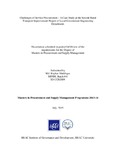Challenges of service procurement: a case study at the second rural transport improvement project of Local Government Engineering Department
Abstract
Procurement of service in the public sector organizations is very large i.e. and a high proportion of the external sourcing are for consultant services. In the Europe around 50% of the total external sourcing of consultants is hired by local governments for, construction work, maintenance work, public transport, garbage collection, social services, consultants and network services etc. Procurement of services in public sector is becoming an increasingly important issue. Support services such as cleaning, catering and security are in a high degree contracted out however outsourcing is applied to other kind of services, namely in public services in which the public organizations must provide to the citizens, increasingly through external supports. The keyword in the current international approach to public procurement is value, which involves making taxpayers’ money go further in meeting user requirements. Value can be further broken down to three popular ideas of public procurement goals: economy, efficiency, and effectiveness. Economy is concerned with minimizing the cost of resources acquired or used, having regard for the quality of inputs. Efficiency is concerned with the relationship between the outputs of services and the resources used, while effectiveness is concerned with the achievement of targets, not only in terms of quantity but also quality. The means by which value is to be achieved is a source of much debate. Economy efficiency through competition can reduce cost and improve quality. However, this is mainly because of increased attention paid to quality through monitoring, explicit inspections, and emphasis on standards. Competition creates lengthy tendering procedures, which increases transaction costs, while the arms length relationship limits the ability of buyers and sellers to forecast accurately the risks and eventualities in the contract.
In the Bangladesh context the service procurement in the public sector is necessary because of insufficient number of skilled persons, huge money involvement of deploying permanent staff, size of government becoming large. The study focuses on challenges of the selection of consultants in the development projects. We know projects means the temporary endeavor undertaken to create a unique product, service or result. The project has a start and an end. There are persons involved in the projects to carry out the project and successful completion of the project. In the successful completion of the projects, the role of consultants is very much vital. The consultant team supports the project personnel and carries out specific job. So the skill, capability, dedication of the consultants is important. It is also important for the consultants to cope with the project personnel. The challenges faced in the selection of consultants should be carefully handled. When the project become sick in the first year for low performance without the presence of consultant, it is very difficult to cover the laggings. But in the next years the targets are re-set and sometimes over program are necessary.

